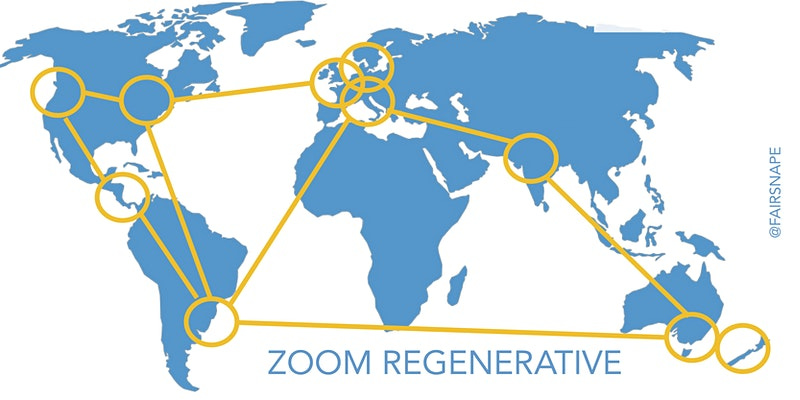Welcome to Regen Notes, a fortnightly newsletter of regenerative news, stories and more, with a focus on the built environment, curated by Martin Brown. (This post originally released on 19th January) Follow and subscribe to Regen Notes here

Question.
On a recent tutored session the question “What is it you need to know right now’? was posed. And it is a great question. In particular, what is it we need to know right now to enable the built environment to progress on climate and ecological crisis matters, as we head towards COP26, other 2021 milestones and beyond to 2030?
Climate.
It is indeed a question many are now asking and many seeking to provide answers to. The recently launched Climate Framework is seeking to break down silos and establish common ground, define a common language, and identify the holistic knowledge and skills every built environment professional must be equipped with to deliver truly sustainable built environments today and in the future.
Education.
There is a resonance here with Rob Hopkins in the Transition Handbook, over 10 years ago. foreseeing a great upskilling in the built environment. Something we are still waiting for. Rob Hopkins continues to inspire on “What If” questions – with his latest podcast asking the question What if rewrote our national curriculum based on permaculture principles? By now, as Rob Hopkins notes, on a journey into ‘From What If to What Next’, it is clear that one of the key things in our world in 2021 that needs reimagining is our education system.
During a series of ‘new normal’ Specifi talks during 2019, I asked the question: What if every MEP trade course started with teaching Ecology 101? It is now clear that building designs will look for more and more nature-based solutions, yet do we understand how nature works?
Nature.
Prince Charles launched Terra Carta, For Nature, People & Planet, with The Sustainable Markets Initiative at the One Planet Summit on the 11th January in Paris, seeking to, amongst other aims ‘broaden the definition of sustainability, beyond simply a net-zero transition, to be inclusive of Nature, People, Planet, Equality and Prosperity’ “Humanity has made incredible progress over the past century, yet the cost of this progress has caused immense destruction to the planet that sustains us. We simply cannot maintain this course indefinitely.”
As reported in the Guardian, a coalition of more than 50 countries has committed to protecting almost a third of the planet by 2030 to halt the destruction of the natural world and slow extinction of wildlife. The High Ambition Coalition (HAC) for Nature and People, which includes the UK and countries from six continents, pledged to protect at least 30% of the Planet’s land and oceans before the One Planet Summit.
Yet the concept of connectivity with nature is something on which we have differing levels of understanding. Miles Richardson and colleagues at Derby University Nature Connectedness Research Group, have launched a free online MOOC course. Made up of eight short units, it provides an opportunity to learn about Nature Connectedness and the value of having a strong relationship with nature.
Earthday
Earthday 2021 is ramping up its planned activities and celebrations on April 22nd with over 1 billion participants. When life around the globe returns to normal, our world cannot return to business-as-usual. Our global community has been shocked by the largest global crisis in a generation. COVID-19 has shown us the necessity of thinking ahead, but the next crises are already on their way. Climate change, species loss, pandemics and massive natural disasters might define the future unless we do something now. We have the solutions, both natural and technological, we just need the will.
Warming.
If we need a reminder wake-up graphic, Ed Hawkins, (of warming stripes) supplied just that with a tweeted global temperature variations image. The thread of this tweet makes great reading for making sense of past warming with additional input (videos and comments) from Katharine Hayhoe. Ed Hawkins @ed_hawkinsGlobal temperature variations over the last 2020 years January 17th 20214,604 Retweets9,053 Likes
Carbon.
Earlier in the week, again on Twitter, Oliver Baldock asked another important question “Anyone have any / know of anyone who has techniques for getting clients to adopt low embodied carbon targets on their project. I’m looking into barriers which are slowing the tackling of embodied carbon in construction and would love to discuss! (and this is another great thread to read) Oliver Baldock @ollie_baldockAnyone have any / know of anyone who has techniques for getting clients to adopt low embodied carbon targets on their project. I’m looking into barriers which are slowing the tackling of embodied carbon in construction and would love to discuss! @ArchitectsCAN @archdeclareJanuary 13th 20216 Retweets23 Likes
My response here is to look at who is doing the carbon reduction approach well, at a client level, a contractor level and external to the built environment. We can look, for example at British Lands Net Zero carbon strategy, at Baxall Construction’s approach to monitoring and reducing carbon at construction level, (NFB Major Contractors Carbon Report pg 23) and externally to BrewDog’s carbon policy and their Make Earth Great Again programme.Martin Brown @fairsnape@ollie_baldock @ArchitectsCAN @archdeclare Make it financially attractive to reduce carbon – as British Land net-zero carbon strategy … 1/3January 14th 20212 Likes
Returning to ‘What If’ questions – and learning from Brewdog, what if the built environment offset twice the amount of carbon it generates, whilst also implementing rigorous actions to take carbon out?
Zoom Regenerative.
Zoom Regenerative returns for its first session of 2021 on 26 January, addressing more what if’s, on vital regenerative themes. Joanna Watchman (Content Comms for a carbon-conscious world and Work in Mind) shares insights on the importance of sharing stories, without greenwash, and as part of Creatives Declare, the importance of transparency in revealing income from fossil fuel clients. And from Diana Ilina, Paris, we hear on the plans to green the city and create a 15 min walkable city.

